Relevant Overviews
- Communication Strategy
- Content Strategy
- Online Strategy
- Online Community Management
- Social Media Strategy
- Content Creation & Marketing
- Digital Transformation
- Thinking tools
- Zettelkasten
- Fediverse
- Blockchain, Crypto, NFTs etc
- Innovation Strategy
- Surveillance Capitalism, Social media and Polarisation (Overview)
- Disinformation in the US 2020 elections
- Communications Tactics
- Psychology
- Productivity
- Social Web
- Media
- Politics
- Communications Strategy
- Science&Technology
- Business

One of my favourite writers/thinkers on all things digital future is "finally, definitely, fully leaving X, and probably all social media..."

"It’s never felt more plausible that the age of social media might end—and soon."Provocative article, looking at the past 20 years as social networking evolved into social media - as I put it back in 2016, the evolution from social media (social as adjective) to social media, where the emphasis is on the noun."A social network is an…
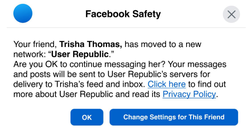
Those who've read Doctorow's books and blogs on the collective action problem stopping people leave the established social media walled gardens may not find anything new, except for the quite brilliant link he makes with "the 1971 film adaptation of Fiddler on the Roof ... the Anatevkans can’t just pack up and leave: they are being …
I suspect this will be a canonical text for me moving forward with myhub.ai.Mike Caulfield in 2015, when my first hub was only about 2 years old, had also "been experimenting with another form of social media called federated wiki... instead of blogging and tweeting your experience you wiki’d it. And over time the wiki became a representation…

Interesting piece on the reverse side of the network effect: the more people leave, the faster the remainder leave. So what will make people leave?Gen Z want privacy, hate bullying/speech, don’t like ads and think "Facebook is for moms and grandparents""Millennials Are Ready to Ditch... too old to bicker with strangers... [and] stil…
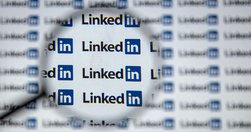
This article absolutely nails why I can't stand LinkedIn anymore, describing the site as completely performative, and the "LinkedIn newsfeed ... as a vast wasteland... almost entirely filled with marketing gurus, salespeople talking sales, and recruiters and “career coaches” offering the same job search tips over and over".Why? Beca…
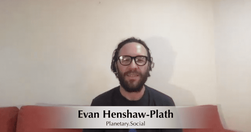
One of a great series of Reimagining the Internet podcasts. Guest: the Planetary.Social founder, discussing:the early days of Twitter: "Twitter's innovation ... happened all at the edges... users created everything... inline images and short links and retweets and the app, actual at and hashtags... the company... cultivated this garden w…
After pointing out that mainstream - ie centralised - social platforms cannot moderate effectively due to scale, then introduces fediverse/activitypub-based platforms. Will they face same moderation problems as the mainstream if/when they grow?Takes Gab's unsuccessful move into fediverse as an example: "Almost immediately, Gab was met by…

Given the myriad problems posed by social media platforms - content moderation, disinformation, censorship, privacy, anti-trust - this article "proposes an entirely different approach... that enables more free speech, while minimizing ... trolling, hateful speech, and large-scale disinformation efforts... also might help users ... regain cont…
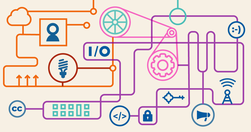
"adversarial interoperability... create a new product or service that plugs into the existing ones without the permission of the companies that make them... once the driver of tech’s dynamic marketplace" now stifled by legal means by Big Tech, which "climbed the adversarial ladder and then pulled it up behind them".EFF sees re…

Fleeting Note (FN): the creation of Fediverse-based alternatives might suddenly become an urgency.
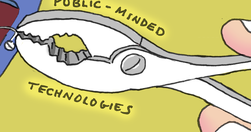
Today's social platforms' business models are not inevitable, but because we see them as such we constrain "the solution space we consider for combatting mis-/disinformation, polarization, and promotion of extremism... we need to consider what technologies [and] digital media to have a productive role in democratic societies".H…

"Our digital public sphere has been failing ... [but] History offers a proven template for how to build healthier public spaces."Filter Bubble author Pariser hearkens back to Walt Whitman's creation of NY's Green Park, when "New York City had no public parks ...only walled commercial pleasure gardens for those who could af…

The president’s reelection campaign ... multimillion-dollar ad blitz ... shaping Americans’ understanding of ... impeachment ... micro-targeted ads ... portraying Trump as a heroic reformer ... while Democrats plotted a coup... An alternate information ecosystem was taking shape ... I wanted to see it from the inside...I was surprised by the effec…

Facebook is wary of being drawn further into a political argument ahead ... divisive presidential election ... ... steer clear of fact-checking political advertisements... keen not to antagonise Mr Trump ... claiming that social media platforms are biased against Republican ... purely a business decision ... ubiquitous... it must always align with…
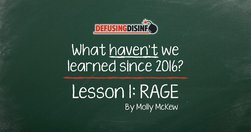
The rage-engage cycle is a key part of how malign narratives gain traction on social media... into traditional media... disinformation content is designed to be polarizing... exploits the business models of social media... pointing out that something is false and dangerous ... giving more oxygen to the fire... [Trump] tests and revises purposefull…
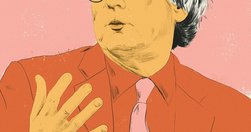
McNamee has mentored many of the people who have transformed Silicon Valley... advised Mark Zuckerberg to turn down Yahoo’s offer... a billion dollars... encouraged Zuckerberg to hire Sheryl Sandberg...Ten days before the Presidential election... “I am disappointed. I am embarrassed. I am ashamed,”... I was expecting them to take it seriously... t…
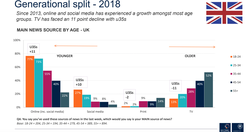
echo chambers and filter bubbles are slightly different... echo chambers could be a result of filtering or ... other processes, but filter bubbles have to be the result of algorithmic filtering...people main source of news roughly equal ... online and television... TV is more likely... people over 45. People under 45 are more likely to get their n…

In the US, radio began as a free-market free-for-all. More than five hundred radio stations sprang up in less than a decade to explore the possibilities... 40 percent were noncommercial... network of interlinked stations playing local and national content supported by local and national advertising, became dominant players...Soviet Union... ideolo…
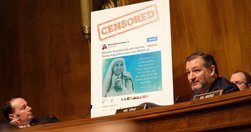
proposal ... for a U.S. government agency to regulate online speech... on all social media.... fails to make the case... the idea that a government agency would necessarily do better is naive... think about exactly who would appoint that agency’s leader, and to what political ends they might seek to put it...

Most criticisms lodged against the content creators that chose to work with the platforms are made with the benefit of hindsight... the decision many publishers made to close down their comment sections should be considered one of the industry’s worst blunders.... editors looked down into their article comments sections and did not like what they …

The systems in the brain that light up when we access our beliefs are the same systems that help us understand stories... the same brain systems involved when people think about who they are and about the beliefs that are most important to them... the default mode network, a set of interconnected areas of the brain associated with identity and sel…

The web was designed to bring people together and make knowledge freely available. Everyone has a role to play to ensure the web serves humanity. By committing to the following principles, governments, companies and citizens around the world can help protect the open web as a public good and a basic right for everyone.

In all the urgent debate about regulating, investigating, and even breaking up internet companies, we have lost sight of the problem we are trying to confront: not technology but instead human behaviour on it... in their search for someone to blame, government outsource fault and responsibility, egged on by media (whose schadenfreude constitutes …

the Oxford Circus panic ... was amplified by social media.... Fear can be transmitted digitally as easily as it can physically—and that’s a problem because digital technologies reach everyone.... the English-speaking world is in the middle of a fear pandemic... Cognitive biases leave us ill-equipped ... Amygdala hijacks and warped media business m…

political scientist Lilliana Mason ... new book, Uncivil Agreement ... we actually agree about most things... “our conflicts are over who we think we are, rather than reasoned differences of opinion... Our opinions can be very fluid... if we wanted to come to a compromise we could, if there were not these pesky identities in the way... we disagree…

the next iteration of technology applied to politics will be a huge leap forward with a greater ability to target people... address each of the 156 million of registered voters on the US with personalized messages.... a falsehood delivered in a personalized way is likely to be more efficient but less visible than a blatant lie put on Twitter; it w…

Newport defines Deep Work as “Professional activities performed in a state of distraction-free concentration that push your cognitive capabilities to their limit. These efforts create new value, improve your skill, and are hard to replicate.”... in an average office setting such a state of prolonged “distraction-free concentration” is all but impo…
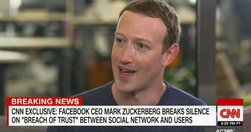
undoing radicalization is not as simple as filling people’s heads with “accurate” facts. A radicalized person will not — cannot — accept them... you need to first make the radicalized person... capable of not feeling threatened, unsafe, and wounded ... It’s very, very hard. It takes social bonds to be restored somehow — oft through therapy, educat…
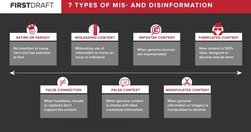
it just felt like the conversations that we were having subsequently were actually pretty shallow and actually pretty useless, because we were talking over each other because everybody meant different things... we can only really start talking about interventions if we understand what we’re talking about... I say, “Please don’t use the term.” “Yea…
Relevant Overviews
- Communication Strategy
- Content Strategy
- Online Strategy
- Online Community Management
- Social Media Strategy
- Content Creation & Marketing
- Digital Transformation
- Thinking tools
- Zettelkasten
- Fediverse
- Blockchain, Crypto, NFTs etc
- Innovation Strategy
- Surveillance Capitalism, Social media and Polarisation (Overview)
- Disinformation in the US 2020 elections
- Communications Tactics
- Psychology
- Productivity
- Social Web
- Media
- Politics
- Communications Strategy
- Science&Technology
- Business